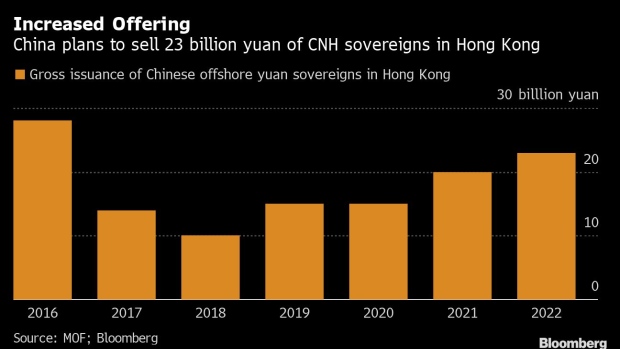Jun 14, 2022
China Will Test Markets With Biggest Offshore Bond Sale Since 2016
, Bloomberg News

(Bloomberg) -- China will launch its largest offshore yuan sovereign bond sale in six years, testing global appetite during a debt market rout and a stream of outflows as global funds offload Chinese government notes.
The Ministry of Finance will auction 7.5 billion yuan ($1.1 billion) of the central government bonds across two, three and five-year maturities on Wednesday, the first of four batches totaling 23 billion yuan planned for this year in Hong Kong, denominated in the offshore currency.
The offering is due on the same day the Federal Reserve is expected to consider its biggest interest-rate increase since 1994 as it looks to contain the hottest inflation in decades. Outflow pressure on Chinese government bonds could increase, given the widening monetary policy gap with the US that undermines the notes’ yield premium.
There are also attractions for domestic investors. The Southbound bond connect, drawing capital from mainland China to bonds available in Hong Kong, offers traders a chance to hunt for arbitrage opportunities between onshore and offshore sovereign debt markets.
“Dim Sum bonds have previously underperformed onshore peers amid capital outflows and yuan depreciation, resulting in a rise in yield premium over onshore peers,” Standard Chartered Bank strategists including Becky Liu wrote in a note, referring to yuan-denominated notes sold in Hong Kong. “Short-dated bonds are likely to receive the strongest support from domestic investors, especially banks.”
Yield Premium
Onshore banks may be more interested in higher-yielding debt, given that a lack of loan demand has left them with abundant cash. The yield premium of Chinese sovereigns traded offshore is as much as 44 basis points over their onshore equivalents across the curve in secondary market trading, according to data compiled by Bloomberg.
The spread reflects different pricing of China’s sovereign risks by overseas and domestic investors. It has widened this quarter as Covid lockdowns damped sentiment toward China’s economic growth. Both onshore and offshore Chinese government bonds trade at yields well below those of equivalent treasuries.
The issuance of yuan-denominated government bonds could also drain offshore liquidity and help stabilize the currency, raising funding costs for offshore shorts as the Fed hikes rates, according to Zhaopeng Xing, a senior strategist at Australian & New Zealand Banking Group. The overnight offshore yuan Hibor fixing rate climbed 28 basis points Tuesday to 2.67%, the highest since April 25.
Foreign ownership of Chinese government debt onshore slid to 10.5% in April from a record high 11.1% in January, according to the latest Chinabond data. The securities recorded a year-to-date loss of 3.8% in dollar terms, according to a Bloomberg index, as the yuan has slid to become emerging Asia’s worst-performing currency in the second quarter.
Still, that compares to year-to-date declines of more than 9% for Chinese investment-grade corporate notes, and 24% for high-yield corporate bonds, according to data compiled by Bloomberg.
©2022 Bloomberg L.P.





